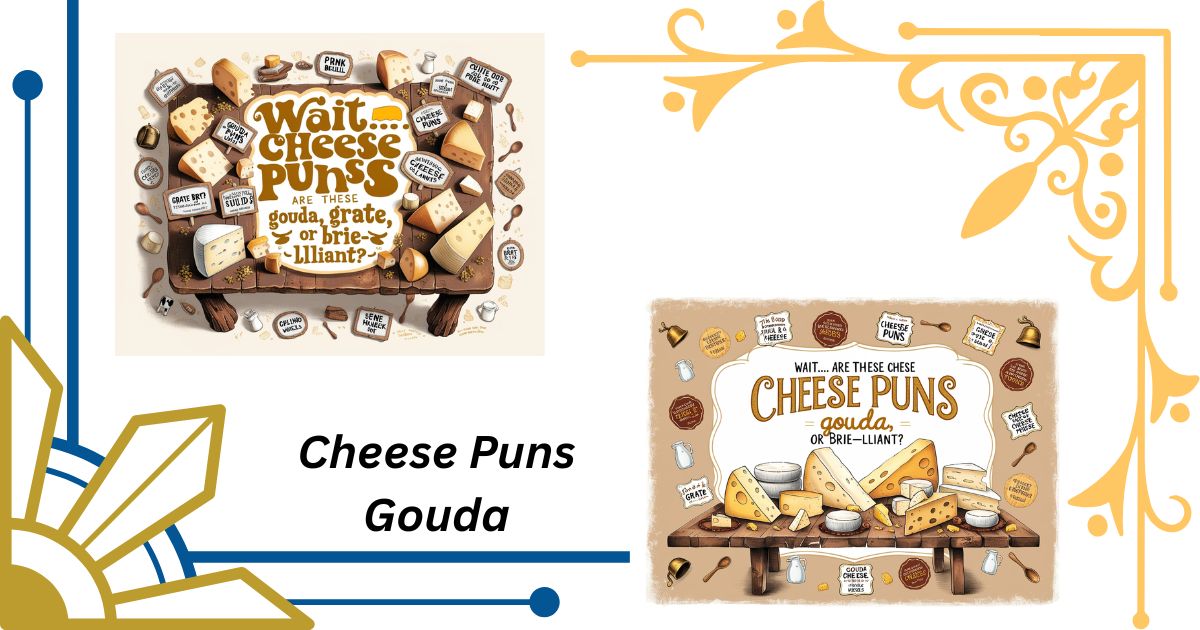Let’s brie honest here. You clicked on this article because you love cheese puns just as much as you love actual cheese. Maybe you’re planning the perfect Instagram caption for your charcuterie board.
Or perhaps you need some grate dad jokes for your next family dinner. Whatever brought you here, you’re about to discover whether these cheese puns are truly gouda enough to make people laugh or if they’re just too cheesy for their own good. Get ready to have a wheely good time!
Introduction: Why Cheese Puns Are a Big Dill
Cheese puns hold a special place in the world of wordplay. They’re the comfort food of comedy. Just like mac and cheese warms your soul, a good cheese pun brings instant smiles and groans in equal measure.
But what makes cheese puns so appealing? The answer lies in their accessibility. Everyone knows cheese. From the pickiest toddler to the most sophisticated food critic, cheese connects us all. This shared knowledge creates the perfect foundation for humor that works across all ages.
Cheese names also offer rich material for wordplay. Think about it. We have Brie, which sounds like “be.” Gouda rhymes with “could have.” Cheddar gives us “better.” The possibilities are endless, and that’s what makes crafting cheese puns so gratifying.
Research shows that puns activate multiple areas of the brain simultaneously. When you hear “That’s nacho cheese,” your brain processes both the literal meaning and the wordplay. This mental gymnastics creates a unique form of satisfaction that explains why puns are both loved and loathed.
The Brie-sics: What Makes a Pun ‘Cheesy’ Yet Clever?
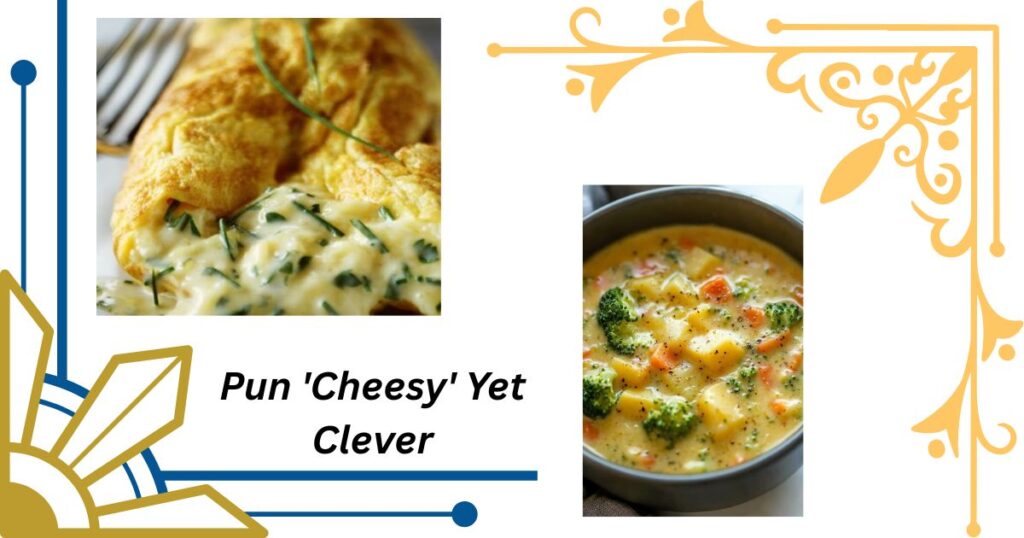
Understanding what makes a quality pun requires examining the mechanics of wordplay itself. The best cheese puns work because they create unexpected connections between familiar concepts.
Sound similarity forms the foundation of most cheese puns. When “Brie” becomes “be” or “Gouda” transforms into “good,” our brains recognize the pattern while appreciating the creativity. This recognition triggers what linguists call the “pun processing pathway.”
Context relevance elevates good puns to great ones. A cheese pun works best when it fits naturally into the conversation or situation. Saying “You’re grate” to someone who just helped you makes perfect sense. The pun enhances the message rather than distracting from it.
Timing and delivery can make or break any pun. The pause before “That joke was pretty cheesy” gives listeners a moment to anticipate the wordplay. This brief suspense amplifies the comedic effect.
The term “cheesy” itself demonstrates how cheese puns have influenced our language. We use “cheesy” to describe something that’s overly sentimental or lacking sophistication. Yet cheese puns embrace this cheesiness as their strength, not their weakness.
Cultural familiarity also plays a crucial role. Cheese puns work because most people understand the references. You don’t need extensive knowledge of dairy production to appreciate “Have a gouda day.” This universal appeal makes cheese puns perfect for diverse audiences.
Gouda Laughs: Classic Cheese Puns That Never Get Old
Some cheese puns have achieved legendary status through years of reliable laughs. These classics prove that simplicity often trumps complexity in wordplay.
- “You’re looking sharp today” – Works because sharp describes both a person’s appearance and aged cheese characteristics. The dual meaning creates layers that make the pun memorable and versatile.
- “That’s nacho cheese” – Became a cultural phenomenon because it combines food humor with casual conversation. The phrase works in countless situations, from actual nachos to any scenario involving ownership disputes.
- “Have a gouda day” – Succeeds through its positive message and easy pronunciation. Unlike more complex puns, this one flows naturally in speech and writing. It’s become so popular that cheese shops regularly use it in their marketing.
- “I’m feeling grate today” – Demonstrates how cheese puns can express genuine emotions while maintaining humor. The pun acknowledges good feelings while adding a playful twist that lightens the mood.
- “You’re the big cheese” – Has transcended pun status to become an actual idiom. This evolution shows how successful wordplay can enter mainstream language. The phrase now appears in business contexts, children’s books, and everyday conversation.
- “Let’s make it a brie-f meeting” – Combines workplace humor with cheese references. Professional settings often benefit from light wordplay that breaks tension while maintaining appropriate tone.
These classic puns endure because they’re immediately accessible. No explanation required. No cultural references to decode. Just simple, effective wordplay that delivers reliable results.
Brie-lliant Wordplay: Creative Puns for True Cheese Fans
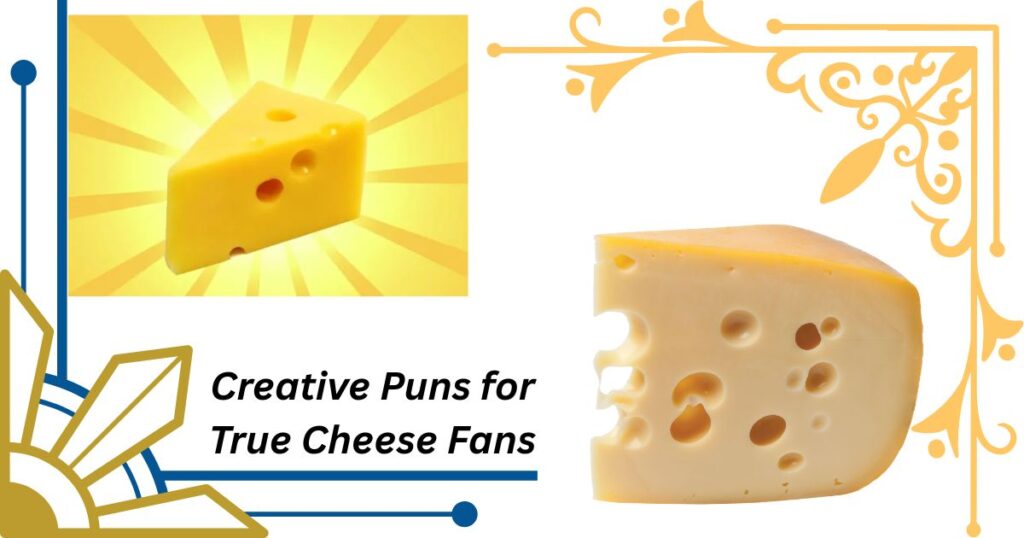
Advanced cheese enthusiasts deserve puns that match their sophisticated palates. These creative examples push beyond basic word substitution into more complex territory:
- “I camembert to think of life without cheese” – Elevates standard pun structure by incorporating emotional depth. The French cheese name adds elegance while the sentiment resonates with genuine cheese lovers.
- “You’re my missing pizza cheese” – Creates romantic wordplay by combining “piece” with pizza imagery. This pun works particularly well for couples who share food adventures together.
- “Don’t go bacon my heart, I couldn’t if I fried” – Technically mixes meat and dairy, but the complexity demonstrates advanced pun construction. Multiple word substitutions create intricate wordplay that rewards careful listeners.
- “I’m not feta up with these puns yet” – Uses a less common cheese to create fresh humor. Feta’s similarity to “fed up” provides the foundation, while the defiant tone adds personality.
- “This conversation is getting pretty intense, or should I say in-tents? No wait, that’s camping. I meant in-cheese!” – Shows how self-aware humor can acknowledge pun awkwardness while doubling down on the wordplay.
- “I tried to think of a cheese pun, but I couldn’t think of any that weren’t too cheesy” – Creates meta-humor by discussing cheese puns within a cheese pun. This recursive structure appeals to wordplay connoisseurs.
- “My love for cheese is grate, but my love for you is even cheddar” – Demonstrates escalating pun structure. The comparison format allows for multiple cheese references while building to a romantic conclusion.
These advanced examples require more mental processing but offer greater satisfaction for audiences who appreciate sophisticated wordplay.
Grate Expectations: When Cheese Puns Go Too Far
Even cheese lovers have limits. Understanding when puns become excessive helps maintain their effectiveness and audience goodwill.
Overuse dilutes impact. Inserting cheese puns into every sentence transforms humor into annoyance. The novelty wears off quickly when audiences expect constant wordplay. Strategic placement creates better results than constant bombardment.
Forced connections weaken pun quality. Stretching cheese names to fit inappropriate contexts makes the wordplay feel artificial. “This traffic is so provolone” doesn’t work because provolone has no connection to traffic conditions.
Inappropriate timing can backfire spectacularly. Cheese puns during serious conversations or somber moments demonstrate poor social awareness. Reading the room prevents pun-related social disasters.
Complex setups that require extensive explanation defeat the purpose. If you need three sentences to explain why your cheese pun is funny, it probably isn’t. The best puns work immediately or not at all.
Cultural insensitivity can occur when cheese puns mock accents or heritage. “That’s-a spicy meatball” stereotypes Italian pronunciation in ways that make some people uncomfortable. Awareness prevents offensive wordplay.
Professional boundaries exist in workplace settings. While light humor can improve office dynamics, excessive punning may undermine professional credibility. Balance maintains both relationships and reputation.
The key lies in moderation and mindfulness. Great puns enhance communication rather than dominating it. They should add value to interactions, not replace meaningful conversation.
Say Cheese! Puns for Instagram Captions & Party Jokes
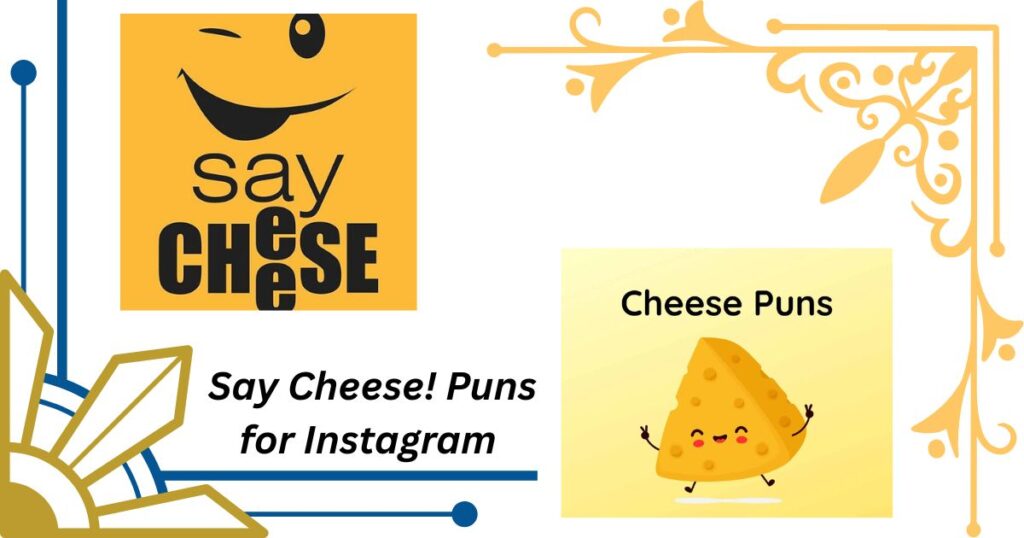
Social media has created new opportunities for cheese pun deployment. Instagram captions, Facebook posts, and Twitter jokes reach wider audiences than ever before.
Instagram-Ready Cheese Puns:
- “Living my best brie” – Works perfectly for food photography. The phrase captures contentment while referencing the luxurious cheese. It’s short enough for captions but memorable enough for sharing.
- “Cheese the day” – Motivates followers while incorporating wordplay. This carpe diem variation encourages positive action with a playful twist.
- “You’re my greatest cheese” – Creates romantic social media content. Couples can use this pun for anniversary posts, date night photos, or relationship milestones.
- “Brie happy” – Offers simple, positive messaging. This pun works for virtually any cheerful occasion.
Party Conversation Starters:
- “Thanks for being so grate” – Works perfectly for host appreciation. The pun acknowledges hospitality while maintaining light atmosphere.
- “This party is the big cheese” – Celebrates successful events. The phrase elevates the gathering while incorporating familiar wordplay.
- “I’m on a roll… butter and cheese roll” – Extends the wordplay concept. The setup creates anticipation before delivering the food-focused punchline.
Cheddar or Cheesy? Rating the Best & Worst Cheese Puns
Quality assessment helps distinguish memorable puns from forgettable attempts. Not all cheese puns achieve the same level of effectiveness or audience appeal.
🏆 Top-Tier Cheese Puns (Grade A+):
- “You’re grate” – Combines clever wordplay with practical application. Expresses genuine appreciation while incorporating smooth word substitution.
- “Have a gouda day” – Receives excellent ratings for its positive energy and easy pronunciation. Works in countless situations without feeling forced.
- “That’s nacho cheese” – Cultural phenomenon status. Memorable and widely recognized across different age groups.
🧀 Mid-Tier Puns (Grade B):
- “I’m feeling bleu” – Shows creative thinking but requires explanation for full impact. Bleu cheese provides the foundation, but the emotional connection isn’t immediately obvious.
- “Let’s make it brie-f” – Competent wordplay with limited applications. Works well in specific contexts but lacks universal versatility.
- “You’re the big cheese” – Classic status but overused in some circles. Still effective when deployed appropriately.
⚠️ Lower-Tier Attempts (Grade C-D):
- “This situation is so swiss” – Doesn’t work because Swiss cheese has no clear connection to general situations. The wordplay feels forced and meaningless.
- “I’m having a ricotta day” – Attempts to use “really gotta” but the pronunciation doesn’t match closely enough to work effectively.
- “That’s so provolone” – Fails because provolone has no logical connection to most situations where this would be used.
Context sensitivity affects pun ratings significantly. A pun that works perfectly at a wine and cheese party might fall flat in a business meeting. Successful pun deployment requires matching content to audience and situation.
Final Verdict: Are These Puns Gouda-nough for You?
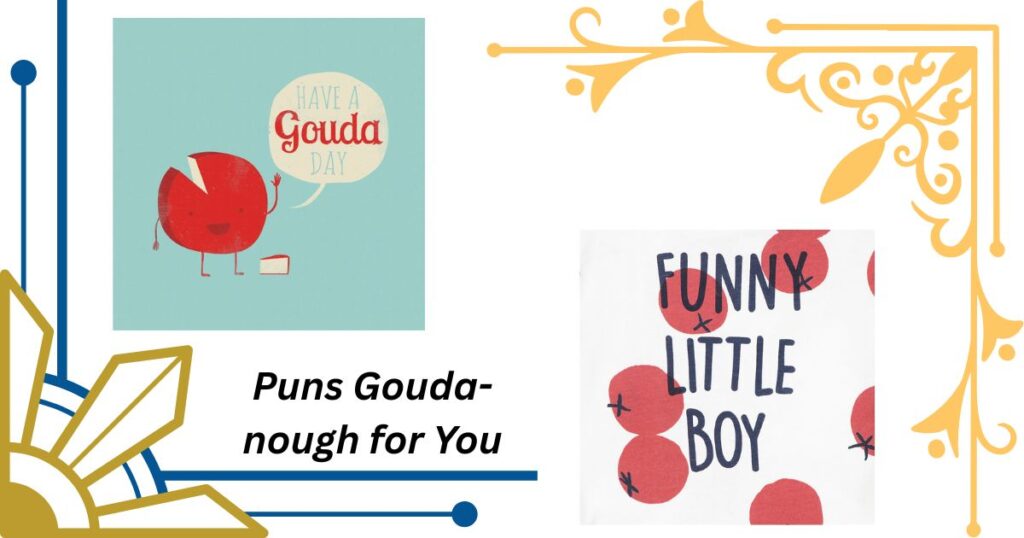
After examining dozens of cheese puns from multiple angles, the verdict becomes clear. Quality cheese puns possess genuine entertainment value when deployed appropriately and sparingly.
The best cheese puns succeed because they’re built on solid wordplay foundations. They make clear connections between cheese names and common words or phrases. They enhance communication rather than replacing it. They bring smiles without requiring apologies.
Versatility separates great puns from merely adequate ones. “You’re grate” works for compliments, appreciation, encouragement, and casual conversation. This flexibility makes it valuable for regular use.
Memorability ensures puns have lasting impact. People remember “Have a gouda day” because it’s simple, positive, and fun to say. Complex puns may impress initially but fade quickly from memory.
Social acceptance varies by audience and context. Close friends and family typically tolerate more frequent punning than professional colleagues or casual acquaintances. Reading social cues prevents pun-related embarrassment.
The cheese puns examined in this article range from genuinely clever to pleasantly cheesy. None qualify as comedy masterpieces, but they serve their purpose effectively. They lighten moods, break tension, and create moments of shared humor.
Personal preference ultimately determines individual pun appreciation. Some people love wordplay in all forms. Others prefer more subtle humor. Most fall somewhere between these extremes, enjoying occasional puns without wanting constant exposure.
Bonus Slice: Reader-Submitted Cheese Puns We Loved
Community contributions often produce surprisingly creative results. These reader-submitted puns demonstrate that cheese humor extends far beyond professional comedy writers.
“I’m not just any gouda person, I’m a really gouda person” came from Sarah in Portland. This pun works because it escalates the wordplay while maintaining the positive message. The repetition creates rhythm that makes it memorable.
“My cheese addiction is getting feta and feta” arrived from Mike in Chicago. The escalating structure works perfectly with feta’s similarity to “fatter.” This pun acknowledges cheese indulgence with self-deprecating humor.
“I tried to make a cheese joke, but it was too cheesy, so I decided to brie myself” came from Jessica in Austin. This meta-pun creates layers of meaning while maintaining logical flow. The self-awareness adds sophistication to simple wordplay.
“Don’t worry, brie happy” was submitted by David in Seattle. This variation on Bobby McFerrin’s classic song works because everyone knows the original lyrics. The substitution feels natural and maintains the song’s optimistic message.
“I’m not trying to be cheesy, but you’re really grate” came from Maria in Denver. This pun acknowledges its own nature while delivering a genuine compliment. The self-awareness prevents the humor from feeling accidental.
These submissions prove that cheese pun creativity extends throughout the general population. Given the right inspiration, anyone can craft wordplay that brings joy to others.
FAQs About Cheese Puns (Because Why Not?)
What makes a cheese pun effective?
The best cheese puns combine clear sound similarities with appropriate context. They should enhance communication rather than disrupting it. Simple wordplay often works better than complex constructions.
Are cheese puns appropriate for professional settings?
Light cheese puns can work in casual professional environments, but use them sparingly. Food industry professionals often have more flexibility with food-related humor than other business contexts.
How can I create my own cheese puns?
Start with cheese names that sound like common words. Brie sounds like “be,” Gouda rhymes with “coulda,” and Cheddar resembles “better.” Build sentences around these sound similarities.
Why do people love cheese puns despite calling them “cheesy”?
The term “cheesy” describes something overly sentimental, but cheese puns embrace this quality as their strength. People enjoy the predictable wordplay and lighthearted nature.
What’s the difference between a good pun and a bad pun?
Good puns make clear connections and fit naturally into conversation. Bad puns strain to create connections or require extensive explanation. Context and timing also affect pun quality significantly.
Can cheese puns be romantic?
Absolutely! “You’re my missing pizza cheese” or “I love you more than mac loves cheese” work well for couples who appreciate wordplay. The key is matching the pun to your relationship’s humor style.
Should I apologize after making a cheese pun?
Only if your audience seems genuinely annoyed rather than playfully groaning. Good-natured groans are actually positive responses to successful puns. Real irritation requires backing off from additional wordplay.
How often should I use cheese puns?
Moderation prevents overuse fatigue. Save cheese puns for appropriate moments rather than forcing them into every conversation. Quality over quantity creates better results.
Do cheese puns work internationally?
English-language cheese puns rely on specific pronunciations and cultural references. They may not translate effectively to other languages or cultures. Consider your audience’s linguistic background.
What’s the future of cheese puns?
As long as people eat cheese and enjoy wordplay, cheese puns will remain popular. New cheese varieties and changing language patterns may create fresh pun opportunities over time.
